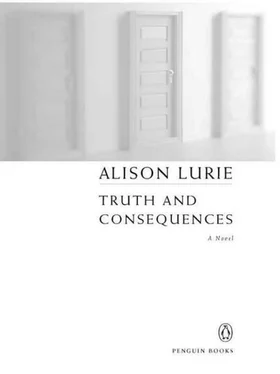“Oh yeah. You can tell he’s stuck on Susie. And he looks like a friendly, ordinary guy, I admit that. I liked him fine at first. But that’s not the point. The point is, what we just found out yesterday, he’s a Muslim.”
“Yes. And?” Jane sighed under her breath.
“Those are the people that blew up the World Trade Center. And they’re awful to women. They each have four wives at once, and they shut them up in the house and make them wear these kind of black tent things when they go out.”
“I’m sure Charlie isn’t that kind of Muslim,” Jane said, hoping this was true. “He’s an educated man, a professor of economics. I’m sure he won’t have four wives and want Susie to wear a tent.”
“Well. Maybe not. But you never can tell. And if she marries him she’ll be far away and cut off from her family.”
“She’ll only be in Columbus, Ohio.”
“Yeah, but still . . .” Linda frowned. “You know, I didn’t much like that boy she was going with before, with his loud voice and his low-life friends, but if Susie had married him she would at least have stayed in town and we could have seen her all the time. You’ve got to talk to her. Please. You can convince her to break it off.”
“I can’t do that, Linda,” Jane said. “And I wouldn’t, anyhow. Susie and Charlie are in love, and people who are in love deserve to be happy together.” As she uttered these words, a desperate sinking feeling came over Jane. “I’m really sorry,” she told Linda, her voice weighted down by all the things she was sorry for.
Crossing the campus ten minutes later, Jane reached the Center and found it in disorder. Since Susie had phoned that morning with the news that Delia Delaney was resigning her fellowship and leaving town the next day, she did not have to pretend to be surprised, but she still had to pretend to be dismayed.
From a practical point of view Jane was slightly dismayed, because of the official hassle that would immediately follow. From the impractical point of view she was worse than dismayed. Delia was going away, a good thing; but Henry Hull was presumably going too. She had not called him, so she would probably never see him again in her whole life. It was a bright early winter day outside, but at this thought the rooms of the Center, especially the office, seemed to be full of dark smoke.
“It’s so sad,” Susie said, raising a gloomy face from her computer. “It just won’t be the same around here without Delia.”
“No, it won’t,” Jane agreed. “But we can’t brood about that; we have a lot to do today. I’ll call Bill and Lily now, and write the e-mails to the other council members and the dean. When you get back from lunch you can send them out, along with hard copies by campus mail. And then you’ll need to get in touch with the payroll and insurance people in Knight Hall.”
“Oh, but I can’t!” Susie wailed. “Delia’s just given me her latest revisions, and I promised I’d type them up and print everything out today so she can take it with her to North Carolina.”
“Really,” Jane sighed. Lately, much of Susie’s time had been spent on Delia’s letters and manuscripts, to the neglect of her actual job. The filing, for instance, hadn’t been done for a week.
“I’m sorry, but that will just have to wait,” she said. “We’ve got to send the official announcements of Delia’s resignation to the Humanities Council today, before it’s all over the campus as a rumor.”
“Oh—but—” Susie wailed. “You know, I don’t have to go out for lunch. If I stay here, maybe I can finish up Delia’s work. She really needs it now, and she’s done so much for me.”
What Delia had done for Susie, Jane thought, was to tell her that Charlie Amir was in love with her, not giving a thought to the possible consequences. “Well. If you want to miss lunch, naturally that’s up to you,” she said.
Bill, when she reached him, was quite untroubled. “I told you so weeks ago,” he said, laughing. “I said Delia wouldn’t be able to take the winter, didn’t I?”
“Yes, you did,” Jane admitted.
“You should be pleased, after all the trouble she’s caused.”
“Well, I am, in a way,” Jane agreed wearily, thinking, If only you knew. “But it always looks bad when a famous visitor cancels a lecture or walks out on the University. And now I have to write to everyone on the council, and Dean Lewis, and the people at Knight Hall, and they’ll all blame us.”
“Of course they won’t. Visiting professors do this kind of thing all the time—especially artists. There was a case just the other year in the Music Department, involving a frozen cello, as I remember.” He laughed.
“Yes, I heard about it,” she said.
“And now you can get a new state-of-the-art copier.”
“Well, that’s true,” Jane said, expressing but not feeling enthusiasm.
What is the matter with me? she thought as she hung up. I used to get a lot of satisfaction out of going into a crisis and putting everything to rights. But now it just makes me tired. I feel as if I were pushing a stone uphill—no, not a stone, something bigger and uglier, like a dead cow.
Next Jane called Lily Unger, who turned out to know the news already. Delia had confided in her yesterday, she admitted, because she knew Lily would understand and would keep her confidence. ( Unlike you and most other people , was implied.) And Lily did understand, completely. Delia was so sensitive, and Southerners just weren’t prepared, biologically or psychologically or even spiritually, for our northern winters, were they?
“I suppose not,” Jane said, thinking that Lily was probably parroting Delia’s excuses. Well, maybe that was the way to go—the letters could, should, say that Delia was resigning for health reasons.
“So you have to be gentle with her. You have to remember that she’s not a tough winter-hardy plant like you, with generations of rural ancestors.”
What the hell did that mean? Jane thought. Well, it meant that Lily was a snob, no surprise really. Okay, my grandfather and great-grandfather were farmers, and I’m not a Southerner, but so what?
“Of course, we’ll all miss her terribly. But what really counts, after all, is her writing, isn’t that true?”
“I suppose so.”
“I expect everyone’s a bit upset at the Center, though.”
“Well, yes. Some of them are,” Jane agreed.
“I have friends here to lunch, but I’ll be over as soon as I can.”
“You don’t have to—” Jane began, but Lily had hung up; it was not like her to miss any crisis.
In fact, many people at the Center were upset. At the buffet lunch Davi Gakar, Charlie Amir, Selma Schmidt, two visiting graduate students, and the entire catering staff from the Hotel School had hovered over Delia, regretting her departure, fetching her plates of food, and presenting books for her to autograph. Delia, looking pale and a little weary in a flimsy gray-blue tunic and long skirt, with her golden-spaniel curls pulled into a ponytail and hanging loose down her back, thanked them all effusively, with Southern spaniel charm. She assured Charlie that no one had ever before understood how to make a cup of coffee exactly the way she liked it; she promised Davi to send his children a signed copy of her Southern folktales.
In the office, Susie was eating crackers and drinking soda from a can and sniveling as she typed, and Selma Schmidt, red-eyed and weepy, was banging about pasting address labels onto cartons of Delia’s books and papers.
“You don’t have to do this today,” Jane told her. “I mean, surely some of these books can be stored at Delia’s house for a while—” Oh, hell, she thought. It’s not Delia’s house, it’s the Vogelers’ house. It’s rented until next May fifteenth—but if Delia and Henry leave, who will pay the rent? She realized with a sinking feeling that there was no lease, only a file of letters, several of them signed by her, Jane, as director of the Center. It had never happened before that a Visiting Fellow had left in the middle of the year, and nobody had asked for an official rental agreement. But maybe Delia and Henry were still liable. Or maybe I am, Jane thought, already beginning to feel exhausted. I must talk to Bill Laird. I must remember to make sure that this never happens again.
Читать дальше







![Кэмерон Доки - Правда и ее последствия[Truth and Consequences]](/books/79610/kemeron-doki-pravda-i-ee-posledstviya-truth-and-con-thumb.webp)




